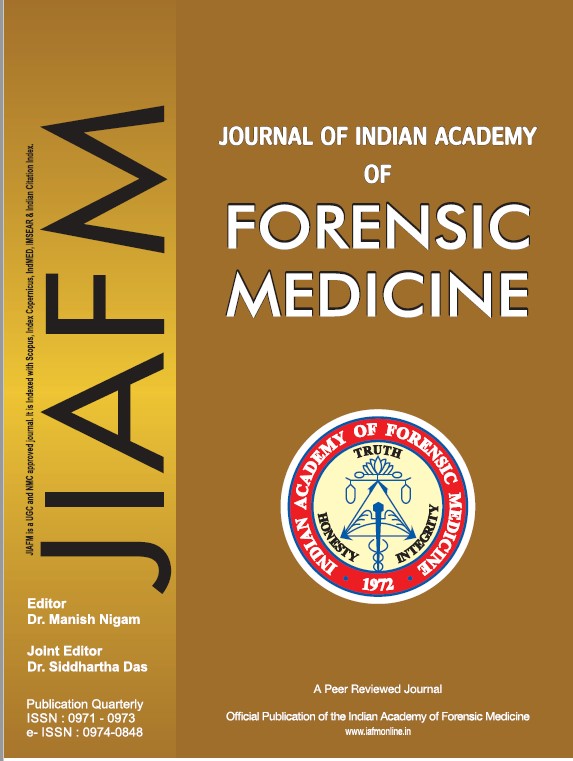A New Model of Integrated Forensic Database in India- Road to Future
DOI:
https://doi.org/10.48165/jiafm.2024.46.1.25Keywords:
Forensic science, Forensic database, Forensic medicine, Evidence, DNA isolationAbstract
th There have been tremendous technological developments in the 20 century which has been called the age of science. Forensic science in th st India also developed in the 20 century and intensified in the 21 century. For timely solving crime cases through proper scientific investigations, a lot of facilities were created in India. But due to the increasing number of crime cases, efforts are being made, but still, it is not enough. There is a further need for improving Forensic Science in India. In countries like the Philippines and Switzerland, an integrated database of these systems has been formulated and implemented to deal with sexual offense cases and sample evidence like DNA and its dealings. This article highlights and discusses the integration of intelligence units of Police, Forensic Experts, and Forensic Medicine Doctors sharing a common database which is linked first in the state and then nationwide, an integrated DNA model which is needed to increase the success rate in sexual assault cases, problems, a roadmap for better future of forensics in India. A feasible model, keeping in mind the Indian scenario and administrative context, has been depicted in detail.
Downloads
References
Das A, Gupta S. Implementation of integrated forensic database india – a need of the hour. Journal of Forensic Medicine and Toxicology. 2022; 39(2).
Tayal DK, Jain A, Arora S, Agarwal S, Gupta T, Tyagi N. Crime detection and criminal identification in India using data mining techniques. AI & Soc 2014. DOI 10.1007/s00146- 014-0539-6
Dinkar JVR. Forensic scientific evidence: problems and pitfalls in India. Int. J. Forensic Sci. Pathol. 2015; 3(2):79–84.
Ribaux O, Margot P. Inference structures for crime analysis and intelligence: The example of burglary using forensic science data. Forensic Science International. 1999; 100(3):193–210.
Walsh SJ, Roux C, Ross A, Ribaux O, Buckleton JS. Forensic DNA Profiling - Beyond Identification. Law Enforcement Executive Forum. 2002; 2(3):13–21.
Margot P. Forensic science on trial - What is the law of the land?. Australian Journal of Forensic Sciences. 2011; 43(2–3):89–103.
Chen Y, Zheng J, Wu D, Zhang Y, Lin Y. Application of the PDCA cycle for standardized nursing management in a COVID-19 intensive care unit. Ann Palliat Med. 2020 May;9(3):1198-1205. doi: 10.21037/apm-20-1084. PMID: 32498535
Rodriguez JJRB, Laude RP, Ungria MCA. An integrated system for forensic DNA testing of sexual assault cases in the Philippines. Forensic Science International: Synergy. 2021; 3: 1-7. https://doi.org/10.1016/j.fsisyn.2021.100133
Rossy Q, Ioset S, Dessimoz D, Ribaux O. Integrating forensic information in a crime intelligence database. Forensic Science International. 2013; 230(1–3): 137-146.
Indian kanoon - Dharam Dev Yadav vs State of Uttar Pradesh on 11 April, 2014.<https://indiankanoon.org/doc/39335671/> (accessed March 18, 2023).
Peterson J, Sommers I, Baskin D, Johnson D. The role and impact of forensic evidence in the criminal justice process, 2010.
Krishan K, Kanchan T. Disaster victim identification - a need to create zone-wise scientific working groups. Curr. Sci. 109 (12) (2015) 2173–2174.
Centre for DNA Finger printing and diagnostics, 1990. [Accessed Apr. 15, 2021]. Available from: .
Kathane P, Singh A, Gaur JR, Krishan K. The development, status and future of forensics in India. 2021. Forensic Science International: Reports; 3.
Ribaux O, Walsh SJ, Margot P. The contribution of forensic science to crime analysis and investigation: forensic intelligence. Forensic Science International. 2006;156(2–3): 171–181.


